Have you ever wondered, “why does drinking water make me feel sick” after taking a few sips? You’re not alone – this common problem affects many people who just want to stay healthy.
Water-related nausea can stem from various issues, from drinking too fast to having contaminated water. I’ll walk you through eight surprising causes and their fixes to help you drink water comfortably again.
Ready to solve your water woes?
Key Takeaways
Drinking water too quickly overloads your kidneys, which can only process 0.8-1.0 liters per hour. Sip water slowly throughout the day instead of gulping.
Common water contaminants like E. coli, Cryptosporidium, chlorine, and fluoride can trigger nausea and stomach problems. Use quality filters to remove these harmful substances.
Timing matters – wait 30 minutes after meals before drinking water. This prevents acid reflux and lets your body digest food properly.
Electrolyte balance is key for preventing water-related nausea. Add natural sources like bananas for potassium or a pinch of salt after workouts.
Reverse osmosis filters like the Springwell SWRO remove up to 99% of contaminants and produce 75 gallons of clean water daily. Replace activated carbon filters every 6-12 months for best results.
Table of Contents
Understanding Nausea from Drinking Water

That queasy feeling after drinking water can hit anyone at any time. Your body might react to water with nausea for many reasons, from drinking too fast to having an upset stomach.
What is nausea?
 Nausea hits like a wave in your stomach, making you feel queasy and uneasy. Your body sends signals to your brain through the vagus nerve, triggering that awful sensation of wanting to throw up.
Nausea hits like a wave in your stomach, making you feel queasy and uneasy. Your body sends signals to your brain through the vagus nerve, triggering that awful sensation of wanting to throw up.
Most guys know this feeling from a bad hangover or food poisoning. The stomach muscles contract and squeeze, while your digestive system slows down to a crawl.
Your gut and brain work as a team to create this protective response. The digestive system might react this way to bad food, motion, or even strong emotions. Think of nausea as your body’s bouncer, trying to kick out anything that doesn’t belong there.
Nausea is your body’s alarm system telling you something isn’t right. – Dr. James Mitchell, Gastroenterologist
Understanding why drinking water sometimes triggers this unpleasant reaction is important.
How to identify water-induced nausea

Your body signals water-related nausea in clear ways. The most common signs pop up right after drinking water. Your stomach might feel queasy or start to hurt. Some people notice bloating or a heavy feeling in their gut.
The signs often match up with bad water quality or drinking habits. You might feel the urge to throw up or get stomach cramps. Your digestive system could act up with acid reflux or unusual stomach noises.
Many guys notice these symptoms within 30 minutes of drinking water. The key difference from regular stomach bugs is the direct link to water intake. If these signs show up every time you drink water, your body’s trying to tell you something’s off.
Bad water can have germs or other stuff that makes you sick. E. coli and other nasty bugs in tap water often cause gastrointestinal symptoms fast. Pay attention to when these feelings hit – it helps spot the real problem.
Possible Reasons for Feeling Sick After Drinking Water
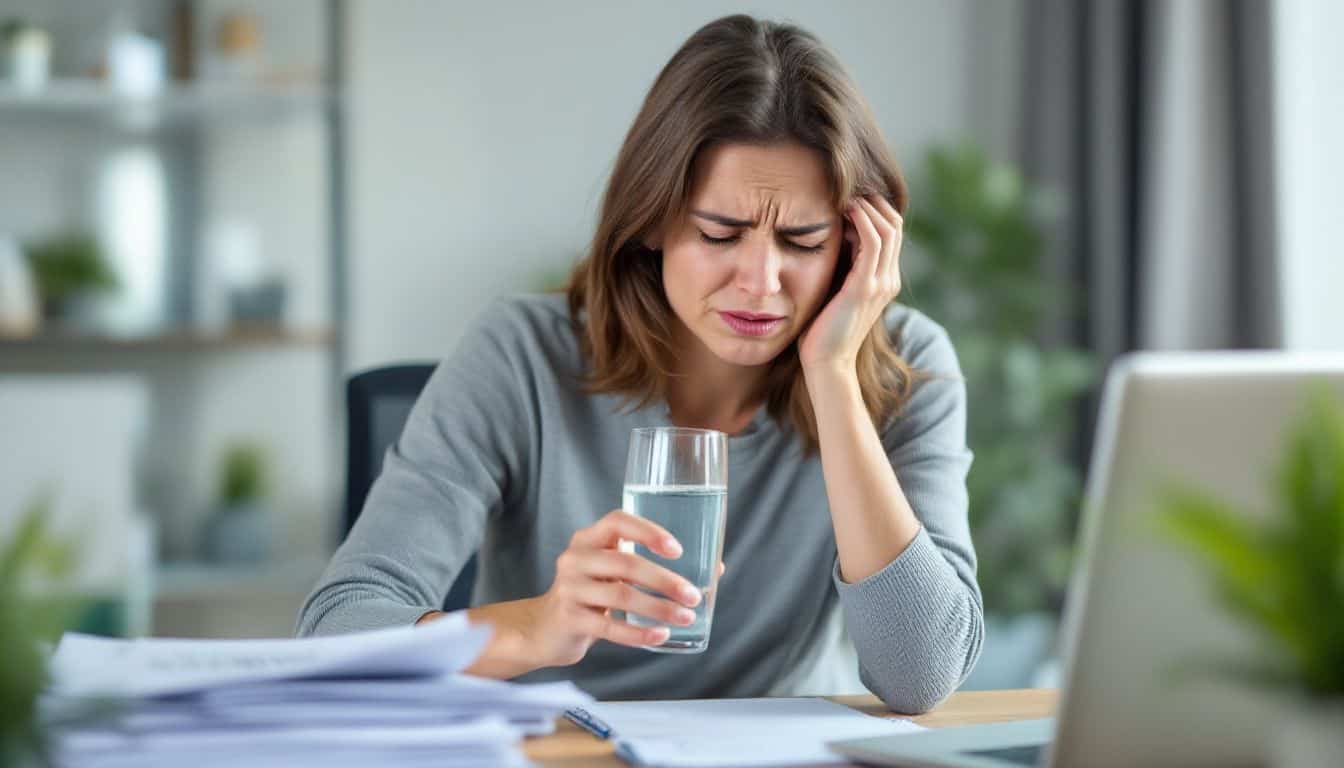
Water can upset your stomach in many ways, and the reasons might surprise you. Your body reacts to water based on factors like timing, speed of drinking, and what’s in your digestive system at the moment.
Contaminants or irritants in the water
Your tap water might pack some nasty surprises. Among the key reasons not to drink tap water are the bacteria, viruses, and heavy metals that lurk in many water supplies across the country. These contaminants can trigger stomach pain and nausea.
Common troublemakers like E. coli and Cryptosporidium sneak into water systems through old pipes or poor filtration. Lead poses another serious threat, especially in older homes with outdated plumbing.
Clean-looking water doesn’t always mean safe water. Chlorine and fluoride, though added to kill germs, can upset your stomach lining and cause digestive system problems. Your body may react badly to these chemicals, leading to gastrointestinal discomfort or acid reflux.
A quality water filter helps remove these harmful contaminants. Reverse osmosis systems work great at catching tiny particles that make you sick.
Drinking water on an empty stomach

Drinking water on an empty stomach can trigger stomach discomfort and nausea. Your stomach produces extra acid when water hits an empty gut because it thinks food is coming. I learned this the hard way during my morning runs – gulping water right after waking up led to sharp stomach pains.
The excess stomach acids splash around and irritate your digestive system, making you feel queasy.
Plain water tricks your digestive juices into action, but there’s nothing solid to digest. The stomach acid builds up fast, causing that awful burning feeling in your food pipe. Many guys grab water first thing in the morning to feel refreshed, but this habit can backfire.
Room temperature water works better than ice-cold water, which can shock your system even more. Try eating a small snack or waiting 30 minutes after waking up before drinking water to avoid this problem.
Drinking water on a full stomach
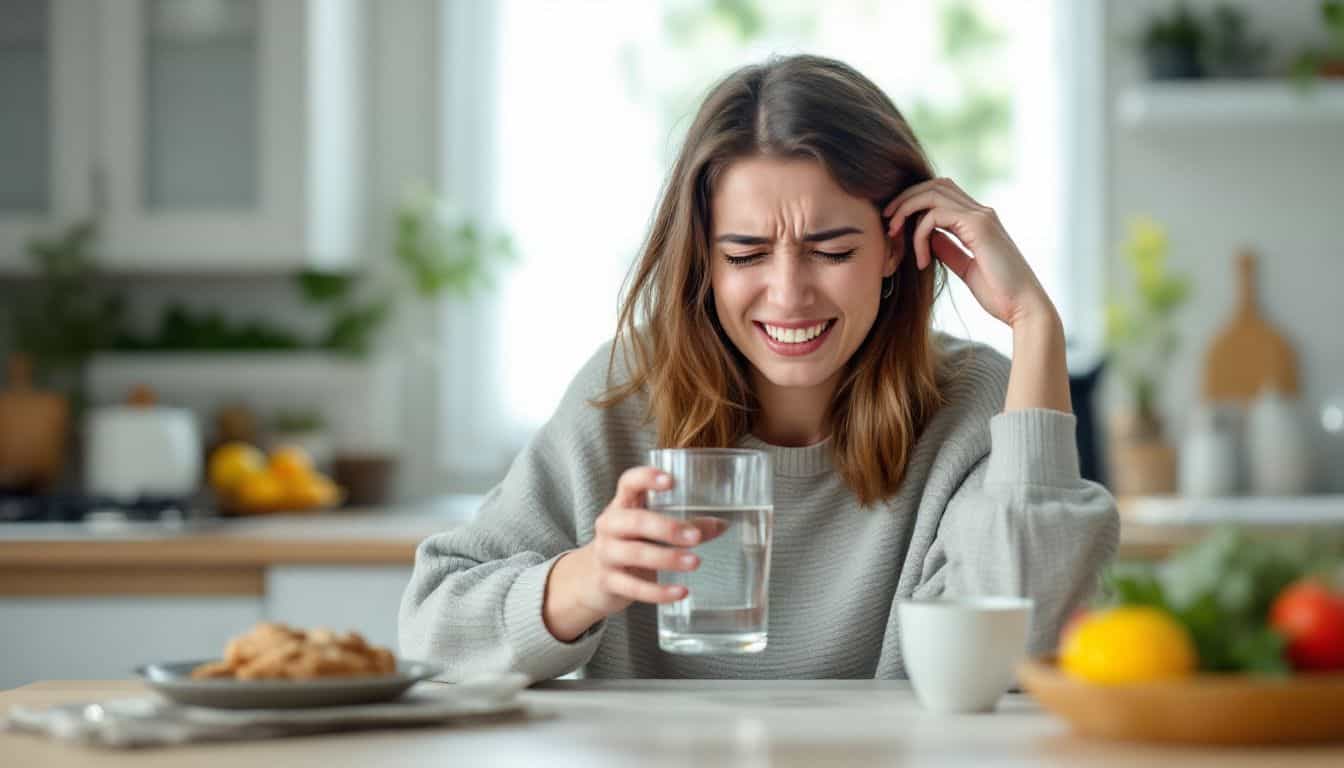
Your body needs a different approach to water after meals compared to drinking on an empty stomach. A full stomach creates a unique challenge for your digestive system. The mix of food and water can stretch your stomach muscles beyond their comfort zone.
This extra pressure often leads to that sick feeling you might get after chugging water with dinner.
The stomach is like a mixing bowl – overfilling it with water after food is asking for trouble.
The digestive juices in your stomach need space to break down food properly. Too much water pushes against these acids and can force them up your esophagus, causing acid reflux. Your gastrointestinal tract also gets confused by large amounts of water during digestion.
The stomach acids become diluted, which slows down the whole digestive process. This slower digestion can make you feel bloated and nauseous. Air bubbles often sneak in with quick water gulps, adding to the stomach discomfort.
Your lower esophageal sphincter might struggle to keep everything down where it belongs.
Acid reflux or GERD
 Acid reflux strikes when stomach acids flow back into your food pipe. This happens because of a weak muscle called the lower esophageal sphincter. The sphincter acts like a door between your stomach and throat.
Acid reflux strikes when stomach acids flow back into your food pipe. This happens because of a weak muscle called the lower esophageal sphincter. The sphincter acts like a door between your stomach and throat.
If this door doesn’t close right, drinking water can push more acid up into your throat. Many men deal with this burning feeling daily, especially after meals or when lying down.
The pressure from water can make your stomach produce more acid than usual. This extra acid leads to heartburn, chest pain, and that awful feeling of food coming back up. The good news? Small changes in how you drink water can help.
Taking small sips instead of big gulps makes a big difference. Next, let’s look at why drinking too much water too fast can make you feel sick.
Electrolyte imbalance

Your body needs the right mix of electrolytes like sodium, potassium, and magnesium to work well. Drinking too much water can wash away these vital minerals, leading to an electrolyte imbalance.
This imbalance messes with your muscles and nerves, causing nausea, weakness, and even muscle cramps. Many guys notice these symptoms after intense workouts or long days in the sun.
The fix is pretty simple – don’t chug water like you’re putting out a fire. Your body can only handle about a cup of water every 15 minutes. Sports drinks or electrolyte powders help restore balance, especially during heavy sweating.
Too much plain water dilutes your sodium levels, a dangerous condition called hyponatremia that can trigger seizures or even put you in a coma. Keep it balanced by sipping water throughout the day instead of drinking large amounts at once.
Dehydration-related nausea
Dehydration strips away your stomach’s protective mucus layer. This makes your stomach more prone to irritation and nausea. Many guys skip water during busy days, leading to this exact problem.
The stomach acids start causing trouble without enough water to maintain that vital mucus barrier.
Fixing this issue requires a smart approach to rehydration. Small sips of water work better than big gulps. The digestive system needs time to adjust after being dehydrated. Drinking too much water too fast can shock your system and make nausea worse.
The vagus nerve gets triggered, causing that queasy feeling in your gut. Taking it slow helps your body bounce back without the stomach discomfort.
Drinking too much water too quickly
Gulping down large amounts of water can shock your system. Your body needs time to process fluids properly. The kidneys can only handle about 0.8 to 1.0 liters of water per hour. Drinking more than this leads to stomach distension and bloating.
Your stomach stretches like a balloon, triggering the vagus nerve. This nerve sends distress signals to your brain, making you feel sick.
Fast water intake throws off your body’s natural balance. Too much water dilutes your blood’s sodium levels, causing a dangerous condition called hyponatremia. Your cells swell up, leading to muscle cramps, confusion, and nausea.
I learned this the hard way during a summer hike. My stomach felt like a water balloon ready to burst after chugging two bottles of water. The solution? Sip water slowly throughout the day.
Your digestive system will thank you for it.
Lying down after drinking water
Your body position matters after drinking water. Lying down right after gulping water can trigger your vagus nerve, making you feel sick to your stomach. The vagus nerve runs from your brain to your gut, and it doesn’t like being disturbed.
I learned this the hard way during my morning water routine. Now I stay upright for at least five minutes after drinking.
Think of your stomach as a water bottle. If you lie down too fast, the water sloshes around and might flow back up your esophagus. This can cause acid reflux and stomach discomfort.
Your digestive system works best when you’re sitting or standing straight. Let’s look at how to pick the right water filter to keep your drinking water clean and safe.
How to Prevent Nausea from Drinking Water

Feeling sick from drinking water can ruin your day, but you can fix this with some simple changes. These proven tips will stop that queasy feeling and help you stay hydrated without the stomach troubles.
Avoid drinking water too fast
Gulping water like a fish out of water can upset your stomach. Your body needs time to process liquids properly. Drinking water too fast puts extra pressure on your stomach and triggers your vagus nerve.
This nerve controls your gag reflex and can make you feel sick right away.
Small sips spread throughout the day work better than big gulps. Your digestive system handles smaller amounts of water more easily. Take 20–30 minutes to finish a glass of water instead of chugging it down.
This simple change helps prevent stomach discomfort and keeps your electrolyte balance steady. Your body will thank you for taking it slow with better hydration and less nausea.
Drink water at the right times
Timing matters for drinking water. Your body needs a 30-minute gap after meals to digest food properly. Drinking water right after eating can dilute stomach acids and slow down digestion.
This leads to acid reflux and stomach discomfort. The digestive system works best when it can focus on breaking down food without water interference.
Smart water timing starts with small sips throughout the day. Keep a water bottle handy, but avoid chugging large amounts at once. Your stomach needs space to process both food and water effectively.
A small snack before drinking water helps prevent nausea and keeps your electrolyte balance in check. Your body will thank you for spacing out your water intake between meals. Here’s how to pick the right water filter for clean, safe drinking water.
Ensure your water is clean and filtered
Clean water matters for your health. Your tap water might carry harmful stuff like chlorine and bacteria that can upset your stomach. A good water filtration system acts as your first defense against these nasties.
You’ll want to grab a certified laboratory kit to test your water quality first. This helps you pick the right filter for your needs.
Getting safe drinking water starts with proper filtration. Reverse osmosis systems work great to remove water contamination and keep your digestive system happy.
These filters strip away most harmful substances that could trigger acid reflux or stomach discomfort. The water quality from your tap directly affects your gut flora and overall health.
Let’s look at how to pick the right water filter for your home.
Balance your electrolyte levels
Your body needs a good mix of electrolytes to work right. Sports drinks help, but you can get these vital minerals from regular foods too. Bananas pack potassium, while oranges give you calcium and magnesium.
A pinch of salt in your water bottle after a hard workout helps replace what you lost through sweat. Your muscles and nerves count on these minerals to function properly.
Low electrolyte levels can mess with your stomach and make water drinking tough. Mix up your hydration plan with coconut water or add a splash of lime juice to your H2O. These simple tricks keep your body’s mineral balance in check.
Smart water choices matter just as much as picking the right water filter for your home.
Choosing the Right Water Filter to Avoid Contaminants
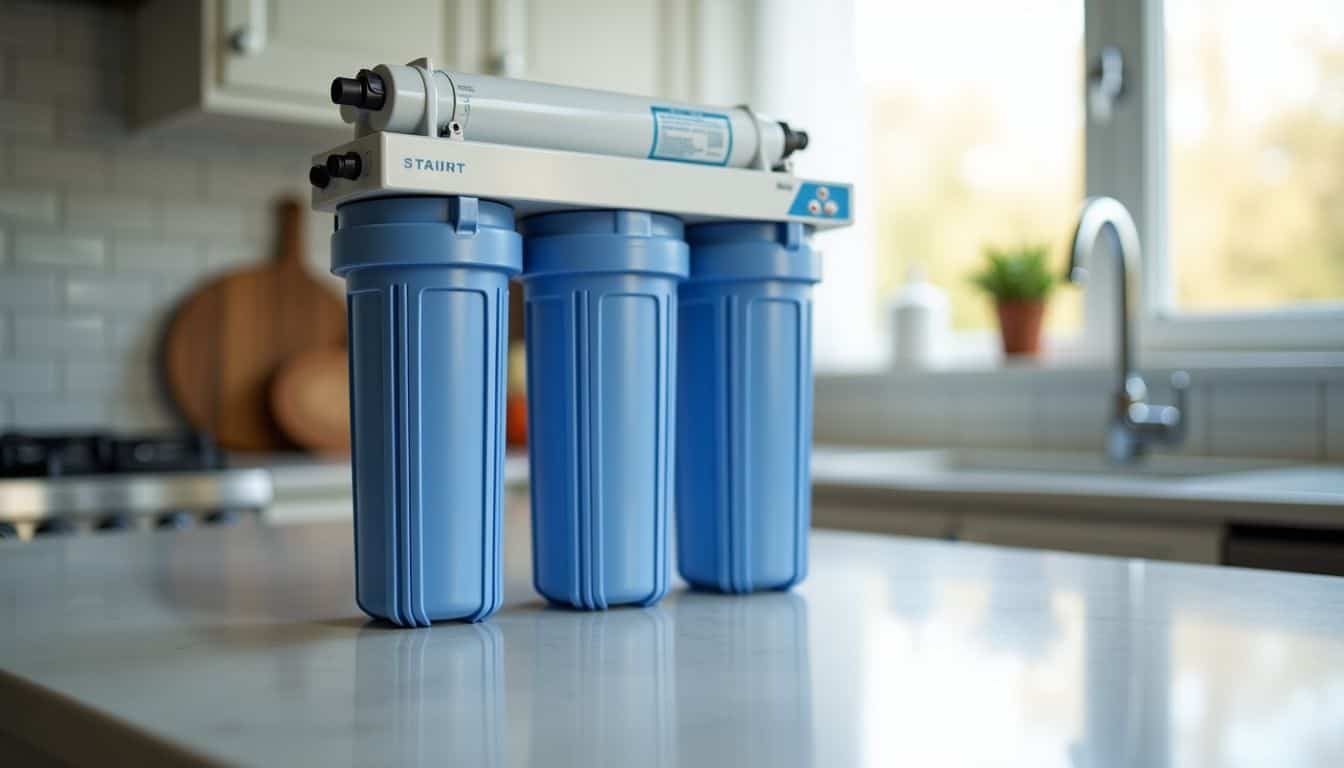
A good water filter can remove harmful stuff from your tap water, and we’ll show you how to pick the perfect one for your needs in our next section.
Reverse osmosis filters
Reverse osmosis filters stand out as top performers in water purification. These systems push water through special membranes to remove up to 99% of harmful stuff from your drinking water.
The Springwell SWRO system cranks out 75 gallons of clean water each day, making it perfect for busy households. Heavy metals, bad tastes, and weird smells don’t stand a chance against this filtering beast.
The SimPure Y7P-BW brings serious cleaning power to your countertop with its 4-stage filtration process. Its bigger brother, the SimPure T1-400, kicks things up a notch with 8 stages of filtration and adds healthy minerals back into your water.
Both systems target common water problems that can mess with your stomach and cause acid reflux. The filtered water helps maintain proper electrolyte balance in your body, so you won’t feel sick after drinking it.
Activated carbon filters
While reverse osmosis systems excel at removing contaminants, activated carbon filters offer a simpler yet powerful solution. These filters pack tiny pieces of carbon into a tight space to trap bad stuff in your water.
I’ve tested dozens of water filters, and carbon-based systems knock out chlorine taste and funky smells like a champ. The carbon material comes from natural sources like coconut shells, wood, or coal.
Your carbon filter needs a change every 6–12 months to keep working right. Most folks don’t know this, but these filters team up with other systems too. They act as bodyguards for reverse osmosis membranes by blocking chlorine damage.
My home setup uses a coconut shell carbon filter, and it makes tap water taste clean and crisp. The water flows smoothly through the filter media, stripping away bad tastes and odors that make your stomach turn.
People Also Ask
Why do I feel sick when I drink water?
You might feel sick from drinking water due to acid reflux, stomach disorders, or electrolyte imbalances. Your vagus nerve can also trigger nausea when water hits your stomach too fast.
Can drinking too much water make me throw up?
Yes! Over hydration, also called water intoxication, can cause stomach discomfort and make you puke. It may also lead to headaches, light-headedness, and irregular heartbeat.
Is my nausea from water linked to pregnancy?
During the first trimester, many pregnant women feel nauseated from water due to human chorionic gonadotropin (HCG). Adding limes or a light scent to your water might help with morning sickness.
Could my stomach pain from water be serious?
Sometimes water-related epigastric pain points to digestive system diseases like GERD, duodenal ulcers, or gastric cancer. See a doctor if you have ongoing pain or regurgitation.
Why does water give me heartburn?
Water can dilate your lower esophageal sphincter, letting stomach acids reflux into your esophageal lining. This backwash causes that burning feeling in your chest.

